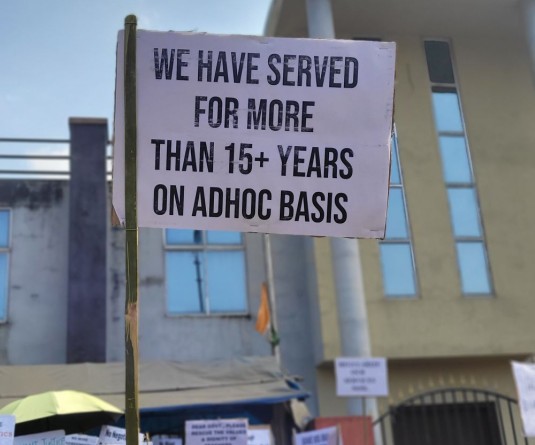Assortment of confiscated liquors are seen in this file photo taken during the disposal of such seized items by the Directorate of Excise, Nagaland in November 2019. More than three decades since the enforcement of the Act, there had been numerous debates, talks and discussion on reviewing or revoking the Nagaland Liquor Total Prohibition Act (NLTP) Act 1989. (Morung File Photo)

Most consultative meeting attendees for ‘total lifting’ if any ‘decision is made at all’
Morung Express News
Kohima | February 24
As the ball is set rolling for review of the contentious three-decade-old Nagaland Liquor Total Prohibition Act (NLTP) Act 1989 yet again, all eyes and ears were on the outcome of the consultative meeting held today at the Nagaland Secretariat Conference Hall, Kohima.
Although media personnel were not allowed during the meeting, sources present at the meeting said except for the church bodies and one other entity, representatives of almost all the tribal bodies and organisations concurred on revoking of the Act ‘in total and not partial.’
When contacted by The Morung Express, the representatives of the Civil Society Organisations (CSOs) invited to the meeting, however, chose to remain discreet about their views shared during the meeting.
But it was learnt that ‘80% of the major tribal hohos’ attending the meeting expressed their desire of total revoking the Act as it is ‘not doing anyone any good.’
“This time even the Naga Mothers Association (NMA) was very flexible on this issue, and have expressed for reviewing of the Act,” quipped an attendee.
With more than three decades since the enforcement of the Act, there had been numerous debates, talks and discussion on reviewing or revoking the Act.
‘Despite the Act being in place, adulterated and spurious liquor of all kinds are readily available in the market, which also comes at higher prices due to the nefarious activities of the syndicate supplier and bootleggers,’ is one of the oft-cited reasons.
Besides huge loss of revenue to the state exchequer, the consumption of spurious liquor has claimed many precious lives over the years, and also left many with serious illness.
It was also revealed that out of 30 odd samples collected by the Food Standards and Safety Authority of India, H&FW Nagaland for testing the quality of the alcohol, 28 were found to be adulterated.
Committee to submit recommendations
Although the February 24 meeting has not discussed anything on timeline for lifting of the Act either partially or in total,’ Advisor, Sericulture, Excise and Minority Affairs, Zhaleo Rio said representatives from various organisations including the churches, came forward with frank and pragmatic suggestions.
When enquired, he divulged that most had expressed their views for revisit of the NLTP Act and for reviewing in accordance with the present time and implement effectively; or if at all the government takes any decision, it should be ‘total lifting’ and ‘not partial.’
On being asked about the report of the Committee instituted earlier in 2018 headed by the additional chief secretary, Rio said that the Committee had two sittings so far.
As per the terms and references, it examined all issues confronting the people, did research on the consumption of liquor in all the urban areas in the state and also studied the economic aspect in comparison with other North-East states, he elaborated.
As many have presented their suggestions in writing, the Advisor maintained that the Committee ‘will further examine and study, apply its mind and work out what would be best for the people.’
The Committee would eventually submit their findings and recommendations to the government ‘as early as possible,” he responded when queried on the time-frame of the submission of its report.
Excise dept a regulatory body
Excise Department, Rio noted, has become a regulatory body with the introduction of the NLTP Act whereas it was a revenue collection department pre-prohibition.
“Pre-total prohibition, annually the state gets more than 5 crore but after the imposition of the Act, through the collection of permit fees, levy duty etc. we are hardly collecting 2-3 lakh,” he disclosed, while adding that smaller states like Mizoram and Meghalaya are generating 200 crore per annum.
‘Although the term revenue is allergic to many, it is important for the development of the state in many aspects’ he underscored promptly.
Why the Act failed
While candidly admitting that the Excise department have not been performing satisfactorily as it should have been, Rio pointed out that the department shouldn’t be blamed alone, saying it is a ‘collective effort of all.’
“The NLTP Act was done at the behest of the Church supported by NMA, in return, we expect that all various stakeholders will play their role, we don’t need to tell them directly, but they should act like Excise department or Nagaland Police,” he remarked.
According to him, if there was a people’s movement, the implementation of the Act would have achieved desired goals.
More consultative meetings?
Usually, many of the major decisions in the state end half-way, without concrete action, even after series of consultative meetings with tribal hohos and CSOs, hindering implementation of many policies in the state.
“It is good to listen to the voice of the people,” replied Rio on being asked, if the decision on revoking of the Act would face similar fate.
He, however, stated that if necessary and suggested by the CSOs, there would be more consultative meetings.
If not, it would incumbent upon the committee to put forth the recommendations based on the written statements presented today, he added.





